 By the end of January 2017, newly-sworn-in US President Donald Trump had already hit the ground running in an attempt to establish a “productive” first 100 days. While his presidency may not have produced as many new laws or policy improvements as his supporters expected (or even think it did), it certainly has not failed to deliver in drama. To commemorate the first 100 days of the Trump administration, we’ve compiled a list of 100 points of interest and controversy (We thought of calling them “Fun Facts”, but there’s actually little fun in any of this) that have become the focus of the media and Trump’s opposition in the first 100 days.
By the end of January 2017, newly-sworn-in US President Donald Trump had already hit the ground running in an attempt to establish a “productive” first 100 days. While his presidency may not have produced as many new laws or policy improvements as his supporters expected (or even think it did), it certainly has not failed to deliver in drama. To commemorate the first 100 days of the Trump administration, we’ve compiled a list of 100 points of interest and controversy (We thought of calling them “Fun Facts”, but there’s actually little fun in any of this) that have become the focus of the media and Trump’s opposition in the first 100 days.
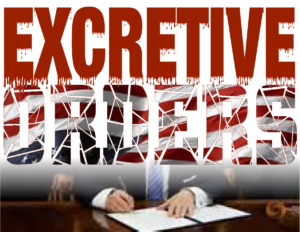
By the end of January 2017, Trump had already hit the ground running in an attempt to establish a “productive” first 100 days. As he signed one Executive Order after another, it seemed that he would almost literally ramrod his “vision” for the country through the Republican control of all three branches of government. These are just some of the Executive Orders Trump signed, which we see as primarily representing a threat to the livelihoods, the economic stability, the civil liberties, the environmental safety and the human rights of Americans and the world at large:
1. An order instructing agencies that whenever they introduce a regulation, they must first abolish two others.
2. An order to restructure the National Security Council and the Homeland Security Council, which had initially placed adviser Steve Bannon in a position of primary influence on the Principals Committee of the Council and removed several military experts, including the Chair of the Joint Chiefs of Staff and the National Intelligence Director. Bannon would be removed from the Council weeks later.
3. An executive order imposing a 120-day suspension of the refugee program and a 90-day ban on travel to the U.S. from citizens of seven alleged “terror hot spots”: Iraq, Iran, Syria, Libya, Yemen, Somalia and Sudan. The executive order was loudly protested by massive crowds at courthouses, government buildings and airports across the country and derided as the “Muslim Ban”.
4. After the first attempt at what had been derided and protested across the nation as a “Muslim Ban” failed, Trump welcomed the month of March by attempting another “Muslim Ban”, this time restricting travel from six nations: Iran, Syria, Libya, Yemen, Somalia and Sudan, and sparing Iraq from the executive order.
5. Multi-pronged orders on border security and immigration enforcement including: the authorization of a U.S.-Mexico border wall; hiring 5,000 more Border Patrol agents; ending “catch-and-release” policies for illegal immigrants; and reinstating local and state immigration enforcement partnerships.
6. A related order for the stripping of federal grant money to sanctuary cities, local jurisdictions that refused to utilize their local police departments to root out undocumented immigrants instead of preventing and solving actual criminal acts. This order was openly defied by several prominent “sanctuary cities” such as New York, which dared the Trump administration to attempt to strip them of federal funding. It was also challenged at the Circuit Court level, resulting in the granting of a stay, essentially defeating the order. Trump has vowed to fight it to the Supreme Court.
7. Two orders reviving the Keystone XL pipeline and Dakota Access pipeline, in spite of the then-ongoing protests in North Dakota, which argued the Dakota Access Pipeline would contaminate the water of the Standing Rock Sioux Indigenous Nation.
8. Trump also signed three orders related to Keystone XL and Dakota Access that would expedite the environmental permitting process for infrastructure projects related to the pipelines, direct the Commerce Department to streamline the manufacturing permitting process, and give the Commerce Department 180 days to maximize the use of U.S. steel in the pipeline.
9. An order to reinstate the so-called “Mexico City Policy” – a ban on federal funds to international groups that perform abortions or lobby to legalize or promote abortion. The policy was instituted in 1984 by President Reagan, but has gone into
and out of effect depending on the party in power in the White House.
10. An order imposing a hiring freeze for some federal government workers as a way to shrink the size of government. This excludes the military, as Trump noted at the signing.
11. An order that directs federal agencies to ease the “regulatory burdens” of ObamaCare. It orders agencies to “waive, defer, grant exemptions from, or delay the implementation of any provision or requirement” of ObamaCare that imposes a “fiscal burden on any State or a cost, fee, tax, penalty, or regulatory burden on individuals, families, healthcare providers, health insurers, patients, recipients of healthcare services, purchasers of health insurance, or makers of medical devices, products, or medications.”
12. According to the March 27 edition of the New York Times, “President Trump, flanked by company executives and miners, signed a long-promised executive order on Tuesday to nullify President Barack Obama’s climate change efforts and revive the coal industry, effectively ceding American leadership in the international campaign to curb the dangerous heating of the planet. Mr. Trump made clear that the United States had no intention of meeting the commitments that his predecessor had made to curb planet-warming carbon dioxide pollution, turning denials of climate change into national policy. At a ceremony, Mr. Trump directed the Environmental Protection Agency to start the complex and lengthy legal process of withdrawing and rewriting the Obama-era Clean Power Plan, which would have closed hundreds of coal-fired power plants, frozen construction of new plants and replaced them with vast new wind and solar farms.”
13. In a related action, Trump ordered the EPA to remove climate change language from its website and begin rolling back a slew of environmental regulations. According to an article on CNN’s website (http://www.cnn.com/2017/04/29/politics/trump-epa-cuts-infighting-
climate-change/index.html), “The White House is also highlighting its EPA regulation roll-backs through use of the Congressional Review Act as one of the brightest moments so far. Speaking to reporters Tuesday, White House Legislative Affairs Director Marc Short called the actions the ‘biggest legislative achievement’ of Trump’s first 100 days in office, next to the confirmation of Supreme Court Justice Neil Gorsuch. The GOP Congress used the law to nullify almost a dozen rules issued in the final months of Obama’s presidency, including the Stream Protection Rule and an Interior Department methane rule that requires oil and gas companies using public lands to control air pollution.”
14. An Executive Order designating Inauguration Day, January 21, as a “National Day of Patriotism”.
15. A March 15, 2017 budget proposal that would eliminate the Corporation for Public Broadcasting (CPB), which is a major funding source for National Public Radio (NPR) and the Public Broadcasting System (PBS), causing protesters to accuse
Trump of trying to destroy Sesame Street.
16. As part of the same budget proposal, the elimination of the National Endowment for the Arts and the National Endowment for the Humanities was also directed. This move, and the order to eliminate the Corporation for Public Broadcasting, makes Trump’s reported May 1 order to discontinue former First Lady Michele Obama’s Let Girls Learn Initiative less surprising but no less outrageous.
17. A March budget proposal called for massive cuts to State Department funding. While the administration has yet to even nominate a deputy Secretary of State, its proposal would also cut the agency’s budget by 31%. A group of 120 retired generals and admirals signed a February 27 letter urging Trump not to cut the State Department’s budget. (http://www.cnn.com/2017/02/27/politics/generals-letter-state-department-budget-cuts/index.html)
18. Consistent with Trump’s stated opposition to the Environmental Protection Agency, and his decision to appoint the anti-EPA Scott Pruitt as the EPA’s Administrator, the Trump administration proposed a massive budget cut to that agency as well. (http://www.cnn.com/2017/04/29/politics/trump-epa-cuts-infighting-climate-change/index.html)
PERSONNEL APPOINTMENTS AND DIS-APPOINTMENTS
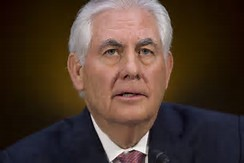
19. Rex Tillerson, former CEO of ExxonMobil, becomes Secretary of State. His time at Exxon corresponds with the corporation’s efforts to sow uncertainty about the human impact on climate change. ExxonMobil also was a major resource extractor in Equatorial Guinea, one of the most unstable countries in Afrika, with a long-standing ruling family that lives in luxury while the populace goes hungry.
20. Sean Spicer is chosen as Trump’s official spokesperson. Spicer would become known for occasionally-unhinged comments and factually questionable statements, and he would be famously parodied by comedian Melissa McCarthy on Saturday Night Live.
21. Kellyanne Conway, who had replaced Paul Manafort during the campaign as Trump’s campaign spokesperson, would continue in the role of “counselor” in the Trump administration. It remains to be seen what type of “counseling” she provides.
22. Omarosa Manigault is appointed as an aide to the president in charge of African American Outreach as well as the communications director for the White House Office of Public Liaison. The occasionally controversial former Apprentice reality-television star had expressed surprise at the cold reception Trump has received from many Afrikan-American voters and personalities, having said that Blacks were “not working hard enough” to work with Trump: “We’re here waiting, willing to work with the community. … This president wants to engage. It’s not a one-way street.” She also stated during the late stages of the presidential campaign that Trump’s opponents would “have to bow down” to him once he was elected president. On Thursday, April 27, at an event sponsored by the National Action Network at which she was invited to speak, Rev. Al Sharpton asked her to tell Trump that “we as blacks and women are, in the first 100 days, seeing a disaster in Washington, D.C.”
23. Scott Pruitt, who had filed 14 lawsuits against the /environmental Protection Agency in Oklahoma, is named EPA Administrator. He would set out to roll back environmental regulations almost immediately upon assuming office.
24. Rick Perry, former governor of Texas who, in the 2011 Republican presidential primaries, had famously vowed to abolish the Department of Energy, is named the Administrator of … the Department of Energy. The fact that he has maintained a very low profile as the new Energy Department head may be an indicator that his opinion of the agency has not changed much since 2011.
25. Betsy DeVos, with no experience whatsoever in public school administration and only a checkered record as a proponent of public-private charter schools in Chicago (most of which have under-performed), is named Secretary of Education.
26. Dr. Ben Carson, famed neurosurgeon whose most recent claim to fame has been an anemic presidential campaign, a series of comments at speaking engagements against poor and low-income citizens in need of federal assistance and the admission that he does not consider himself qualified to run any agency, is named Secretary of Housing and Urban Development.
27. Andy Puzder, the fast-food magnate who had opposed raising the minimum wage, is Trump’s choice as Labor Secretary. Puzder’s nomination would be withdrawn after protests from workers’ unions and questions about his record.
28. Mike Flynn, Trump’s choice as National Security Adviser, later is revealed as having made contact with Russian officials on several suspicious occasions. Flynn is also revealed to have served as a paid foreign agent for Turkey during the transition, when he had been involved in national security briefings, without having notified anyone.
29. Steve Bannon is named to a special strategic adviser post. He and Chief of Staff Reince Priebus would differ regarding the administration’s proposed policies, and Bannon’s previous position as CEO of Breitbart would lead to accusations that he was using his position as “the voice of the Alt-Right” to infuse a White Nationalist, or even White Supremacist, viewpoint into the Trump administration.
30. Former South Carolina Senator Jefferson Beauregard Sessions III is named Trump’s Attorney General. He is approved by the Senate after a contentious battle that included a brief Democratic filibuster and a rather stunning rebuke of Senator Elizabeth Warren (D-Massachusetts) by Senate Majority Leader Mitch McConnell (R-Kentucky). Sessions was known to have prosecuted Afrikan-American civil rights workers in South Carolina during his time as that state’s Attorney General in 1985 (see the analysis by Kristen Clarke, President and Executive Director of the Lawyers Committee for Civil Rights Under Law, Jeff Sessions, The Marion Three, and Why We Need an Attorney General Who Will Fight Voter Suppression, https://lawyerscommittee.org/2017/
01/jeff-sessions-marion-three-need-attorney-general-will-fight-voter-suppression/) and has pushed several US cities to rescind the consent decrees they signed in the aftermath of incidents of police brutality since he became US Attorney General.
31. Neil Gorsuch is nominated by Trump as the new Supreme Court Justice, filling the seat vacated by the death of Antonin Scalia in 2016. Democrats had opposed this nomination and had mounted a filibuster that prompted Republicans to use their majority to change the rules to break the filibuster. Democrats resorted to this “obstructionist” tactic because of Gorsuch’s strict anti-abortion views, his rulings in favor of corporations even in situations such as the “freezing truck driver” case (a truck driver was fired for leaving his rig after it had broken down in freezing temperatures, even though promised aid never arrived), and the fact that Senate Republicans had refused to even consider Merrick Garland, President Obama’s nominee from over a year before.
32. Sebastian Gorka, an English-born Hungarian right-wing former Breitbart columnist, is brought on as an assistant adviser.
33. Ajit Pai, Trump’s pick to run the Federal Communications Commission (FCC), immediately set out to gut consumer-protection regulations. According to a February 5, 2017 article in the “failing” New York Times (https://www.nytimes.com/2017/02/05/
technology/trumps-fcc-quickly-targets-net-neutrality-rules.html), “In his first days as President Trump’s pick to lead the Federal Communications Commission, Ajit Pai has aggressively moved to roll back consumer protection regulations created
during the Obama presidency. … Mr. Pai took a first swipe at net neutrality rules designed to ensure equal access to content on the internet. He stopped nine companies from providing discounted high-speed internet service to low-income individuals. He withdrew an effort to keep prison phone rates down, and he scrapped a proposal to break open the cable box market.”
34. Sally Yates, an assistant Attorney General from the Obama administration, warns the Trump administration about Mike Flynn’s apparent failure to inform authorities that he had met with Russian officials during the campaign and transition, and that he had been a paid agent for Turkey. Shortly thereafter, Trump fires Yates, allegedly because she disagreed with him about the constitutionality of his proposed “Muslim Ban”.
35. As of Day 99 of the Trump presidency, a total of 71 nominations had been made to his Cabinet and high-level positions, the lowest number since this statistic has been counted. Hundreds of positions in the Trump administration, including almost all of the Assistant Secretary positions, remain unfilled as of this writing.
36. Meanwhile, the apparent turmoil within the Trump administration, often dubbed the “palace intrigue” in the White House, has led political adversaries, media commentators, and even late-night talk-show hosts to speculate as to who the “real president” is. Is it Trump? Is it Steve Bannon? Is it Jared Kushner? Or does it change with the (political) weather?
FAMILY TIES
 37. Ivanka Trump, the president’s daughter, would receive an unofficial role in the administration, though she would receive an office and would be present at many of Trump’s high-level meetings with other heads of state. Her application for a top security clearance was not approved.
37. Ivanka Trump, the president’s daughter, would receive an unofficial role in the administration, though she would receive an office and would be present at many of Trump’s high-level meetings with other heads of state. Her application for a top security clearance was not approved.
38. Ivanka Trump’s husband, Jared Kushner, would be given a more official role as a senior adviser. He would be charged with eliminating waste in government and attempting to broker Middle East peace, among other duties, despite his young age (36 at the time of his appointment).
39. Trump has placed his many business ventures in what he calls a “blind trust”, though he placed it under the control of his sons, who no doubt consult him on a regular basis, thus negating any claims that this is a “blind trust”. The Emoluments Clause, among other regulations, is supposed to prevent a sitting president from influencing policy that would benefit his or her business interests. Trump seems to have disregarded these regulations entirely.
SECURITY? WHAT SECURITY?
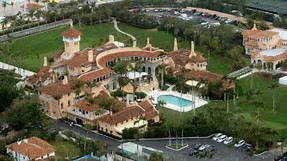 40. The Secret Service is stretched thin by its responsibilities to protect Trump in the White House, while also protecting First Lady Melania Trump in Trump Tower in New York City, and also providing security at Trump’s Mar-A-Lago resort in Palm Beach, Florida. Trump held a meeting there and took a phone call to discuss classified business, out in the open among guests, at the resort in March.
40. The Secret Service is stretched thin by its responsibilities to protect Trump in the White House, while also protecting First Lady Melania Trump in Trump Tower in New York City, and also providing security at Trump’s Mar-A-Lago resort in Palm Beach, Florida. Trump held a meeting there and took a phone call to discuss classified business, out in the open among guests, at the resort in March.
41. Trump continues to reject concerns about the links between his campaign and Russian efforts to influence the November 8 election, despite the fact that Flynn and other members of the Trump team have been revealed to have had several contacts with Russian officials during the campaign and the transition.
42. Trump’s sometimes-reckless tweets have raised concerns about the possibility of inadvertently revealing classified information and compromising national security.
STATECRAFT (OR THE LACK THEREOF)
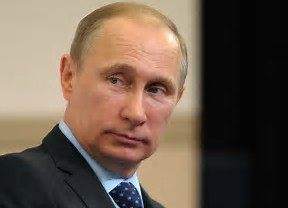 43. Trump had cultivated a relationship with Russia’s president Vladimir Putin since the campaign, comparing his “strong leadership” to the “weak leadership” of President Obama. This relationship has since cooled.
43. Trump had cultivated a relationship with Russia’s president Vladimir Putin since the campaign, comparing his “strong leadership” to the “weak leadership” of President Obama. This relationship has since cooled.
44. Before taking office, Trump accepted a congratulatory call from the President of Taiwan, apparently unaware that this would cause something close to an international incident with China, which does not recognize Taiwan. The United States has had a long-standing policy of not officially recognizing Taiwan, even though the US is not considered an enemy of that country.
45. By placing individuals such as Steve Bannon, Stephen Miller and Sebastian Gorka in close proximity in his administration, and paying close heed to the rants and antics of Alex Jones (a once self-styled political commentator who now calls himself a “performance artist” in the wake of accusations in a separation lawsuit), Trump seems to have been signaling his willingness to be influenced by the “Alt-Right”, a political philosophy that many commentators view as White Nationalist.
46. Early in his presidency, Trump reportedly berated Australia’s Prime Minister Malcolm Turnbull on the phone over an Obama-era refugee deal in which the US was to take up to 1,250 refugees that Australia houses in detention camps on the Pacific island nations of Nauru and Papua New Guinea.
47. On March 6, in response to an illegal chemical attack on a Syrian town widely blamed on the Bashar al-Assad regime, Trump ordered a strike at the airbase that had launched the attack, sending 59 Tomahawk cruise missiles in a strike on the Al
Sharyat Airfield.
48. On April 12, under orders from the Trump administration, the Massive Ordinance Air Bomb (MOAB), or as it was more informally called, the “Mother Of All Bombs (MOAB)”, was detonated at a remote Islamic State (IS) base in Afghanistan. It was the largest non-nuclear device ever detonated. The Bush and Obama administrations had resisted using it for the entirety of their eight-year presidencies. Trump resorted to it in fewer than three months.
49. On March 17, German Chancellor Angela Merkel visited the White House. The visit was marked by what appeared to be Trump’s refusal to shake Merkel’s hand, even after prompting by photographers, which Trump apparently pretended not to notice.
50. On April 28, Day 99 of the Trump presidency, he was quoted as having warned that a “major conflict” was looming with North Korea. Political analysts and journalists considered this an extremely reckless statement, designed to escalate the tension between the US and North Korea’s young ruler, Kim Jung-Un.
VAPID ANALYSIS
The following are several assertions from either Trump himself or members of his administration that, in our opinion, strain the limits of common sense, forge new frontiers in naiveté and push the boundaries of conspiracy theory. Most of these are not direct quotes, so we have placed them in italics when a direct quote was not available to us.

from cafepress.com
51. Climate change is a hoax perpetrated by the Chinese.
52. By singing Executive Orders to allow Arctic and Atlantic drilling and the Keystone and Dakota Access Pipelines, thousands of good jobs will be created. (This despite the fact that even energy experts have asserted that coal is a technology of the past, that the notion of “clean coal” is more speculative than real, and that the resulting rejection of solar and wind power development means the actual loss of jobs in those expanding clean-energy technologies.)
53. The protesters at Congressional public meetings calling for the retention of the Affordable Care Act and the protection of Muslims and immigrants are “professionals … brought in from out of state on buses”. (Meanwhile, many of the pro-Trump counter-protesters admitted they were the ones who often had come from other districts or other states when questioned.)
54. The one-page Tax Plan released at the end of April is brilliant and beautiful, despite the fact that the only thing it says is that corporations and the well-to-do will see their income taxes cut in half.
55. Frederick Douglass is “an example of somebody who’s done an amazing job and is being recognized more and more.” (Trump, in a February 2 breakfast meeting with Afrikan-American supporters to recognize Black History Month and the opening of the National Museum of African American History and Culture) This remark has led to criticism that Trump was unaware of Douglass’ true historic significance, as well as several jokes that Trump believed Douglass was still alive.
56. Mike Flynn was treated horribly. He had been vetted by Obama, but the second he’s caught having dealt with Turkey and Russia (all of which, by the way, happened after he had been fired by the Obama administration), suddenly the Fake News Media says it’s Trump’s fault! (though the vetting process for National Security Adviser should have been much more thorough than it would have been before, which indicates that the Trump administration is the one that had failed to properly vet Flynn).
57. NAFTA is horrible … Well, no, maybe it isn’t. Okay, we’ll keep it for now until I can find a way to change it or eliminate it. (Actually, in many ways NAFTA is horrible, but clearly Trump’s team has no clue as to why.)
DUPLICITY (SWAMP MAINTENANCE)
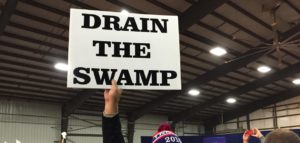 58. “Drain the swamp.” Trump then proceeded to place oil industry cronies, right-wing ideologues and corporate apologists with no knowledge of, and little apparent concern for, the impact of governance on people’s lives, in key positions in his Cabinet and among his close advisers.
58. “Drain the swamp.” Trump then proceeded to place oil industry cronies, right-wing ideologues and corporate apologists with no knowledge of, and little apparent concern for, the impact of governance on people’s lives, in key positions in his Cabinet and among his close advisers.
59. “I want to give everybody great health care.” He then proceeded with his “repeal and replace” plan for “ObamaCare” and attempted to replace it with what came to be derisively known as TrumpCare (“something much better and much cheaper”), which, according to health professionals from almost every corner, would have the immediate impact of stripping up to 24 million Americans of health insurance.
60. “We are giving government back to you, the people.” (Trump’s proclamation during his inauguration speech, which seemed to be comparing the Obama presidency, and perhaps others before that, to dictatorships. Hardly a diplomatic statement with former presidents Obama, George W. Bush and Jimmy Carter in attendance.) He went on as president to sign a series of Executive Orders that would aim to take away people’s health care, roll back civil rights, destroy the water and air that the people need to live, and enrich the wealthy while further impoverishing the poor and working classes. This led a few late-night comedians and commentators to compare Trump’s declarations to similar words spoken by the character Bane in the Batman move The Dark Knight Rises, in which Bane announced he was giving Gotham City “back to you, the people” and then prepared to detonate a nuclear bomb in the city. Which “people” was Bane – I mean Trump – “giving” government back to?
61. As was discovered at the end of April and his first 100 days, the Trump Inauguration reportedly amassed a fund of over $107 million, double the amount of the 2009 Obama Inauguration, which had set the previous record (about $53 million). Obama’s Inauguration, however, was the largest ever, in terms of attendance and invited guest performers, while Trump’s paled in comparison. So, what happened to all that money?
RACIALLY INSENSITIVE STATEMENTS
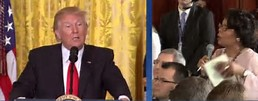
from politicsusa.com
62. “The Blacks” (from several Trump campaign events and interviews)
63. “Where’s my African American?” (from a Trump campaign appearance)
64. “They’re bringing drugs, they’re committing crimes … Some of them are good people” (Trump’s attack on Mexican immigrants from early in his campaign)
65. “Pocahontas” (Trump’s derisive attacks on Massachusetts Democratic Senator Elizabeth Warren, who claims some Indigenous “Native American” ancestry)
66. “Are the CBC [Congressional Black Caucus] friends of yours? Will you set up a meeting with them for me? Set up a meeting.” (Trump to Afrikan-American White House Correspondent April Ryan)
STATEMENTS OF QUESTIONABLE KNOWLEDGE OR SANITY
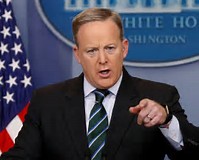 67. “This was the largest audience to witness an Inauguration, PERIOD.” (Sean Spicer)
67. “This was the largest audience to witness an Inauguration, PERIOD.” (Sean Spicer)
68. “Stop shaking your head. … Stop shaking your head.” (Sean Spicer, to April Ryan)
69. “Sean gave alternative facts to that.” (Kellyanne Conway invents a new buzzword)
70. “You are Fake News.” (Trump to an apparently overly-inquisitive journalist)
71. “Our opponents, the media and the whole world will soon see as we begin to take further actions, that the powers of the president to protect our country are very substantial and will not be questioned.” (Trump adviser Stephen Miller on NBC’s Meet The Press, Sunday, February 12, 2017)
72. “Flynn is a good man. … He’s been treated unfairly.” (Trump, on several occasions)
73. Obama is tapping my phone in Trump Tower. Repeated in statements as well as Tweets from Trump. No evidence has ever been found that Obama wiretapped or otherwise conducted surveillance on Trump, aside from incidental surveillance of
Trump staff who may have engaged in questionable communications with Russian or other foreign officials. Then, in an April 30 Face the Nation interview with CBS News Chief White House Correspondent John Dickerson, Trump abruptly ended the discussion when Dickerson asked him if he stood by his wiretap accusation. “I don’t stand by anything. You can take it the way you want. I think our side’s been proven very strongly. And everybody’s talking about it. And frankly it should be discussed. I think that is a very big surveillance of our citizens. … And we should find out what the hell is going on. … You don’t have to ask me. … Because I have my own opinions. You can have your own opinions. … OK, it’s enough. Thank you. Thank you very much.” (from http://www.newsday.com/news/nation/donald-trump-abruptly-ends-cbs-news-interview-after-wiretap-question-1.13547624)
74. “Bill O’Reilly shouldn’t have settled. Bill O’Reilly did nothing wrong.” (O’Reilly still was fired from Fox News, which had settled with plaintiffs for a combined $13 million in sex-harassment lawsuits involving O’Reilly and Roger Ailes in the past.)
75. “China is manipulating its currency.” (prior to meeting Chinese President Xi Jinping)
76. “China is not manipulating its currency.” (after meeting President Xi at Mar-A-Lago over dinner and the “best chocolate cake ever”)
77. “China stopped [manipulating its currency] as soon as I was elected,” implying that China changed its behavior entirely because Trump was now on the scene. Apparently, that chocolate cake he and Chinese President Xi shared at Mar-a-Lago was very good indeed.
78. “The FAKE NEWS media (failing @nytimes, @CNN, @NBCNews and many more) is not my enemy, it is the enemy of the American people. SICK!” (a Trump tweet, February 17, 2017)
79. Obama plays too much golf. … I won’t have time to play any golf; I’ll be too busy working. (Obama has played less golf after leaving the White House than Trump has been seen playing in the first 100 days.)
80. “Nobody knew health care reform was this hard.” (The Clinton and Obama administrations knew it was much, much harder than this.)
81. “How can some judge sitting on an island in the Pacific decide what’s best for America?” (Attorney General Sessions, referring to a Federal judge in Hawaii – a state, not just an “island in the Pacific” -who had ruled against Trump’s second iteration of the “Muslim Ban”)
82. I thought being president would be easier. (Trump, toward the end of his first 100 days in the White House) Trump would explain that remark in his April 30 Face the Nation interview with John Dickerson as his acknowledgement that the job of the president was a challenging one, but that he still “loved” it.
UTTER HUBRIS
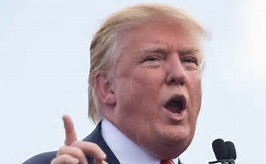 83. We won by the largest margin ever (Trump, before being reminded he lost the popular vote)
83. We won by the largest margin ever (Trump, before being reminded he lost the popular vote)
84. I meant we won the Electoral College by the largest margin ever (before being reminded that both Obama Electoral College victories were considerably larger)
85. I meant we had the largest Electoral College victory ever by a Republican (before being informed that George W. Bush and Ronald Reagan won by larger margins)
86. I would have won the popular vote had millions of people not voted illegally (which not only makes a claim that has absolutely no data to back it up, but also sets the stage for further efforts by right-wingers to push for more draconian voter-intimidation policies in the future)
87. “I’m the least racist person you will ever meet. … I’m the least anti-Semitic person you will ever meet.” (No explanation needed here.)
88. The people love me (despite the lowest start-of-term approval ratings of any president in polling history)
89. “We’re going to build a wall, and Mexico will pay for it!” (a claim that is becoming more and more clearly out-of-touch with reality)
90. “We’re going to do so much winning” (late in the campaign, obviously before a decidedly un-winning first 100 days)
91. We’ve accomplished more in our first 100 days than any presidency before (actually, they’ve accomplished less than anyone since a count was taken, including ZERO legislative victories and a string of failed Executive Orders that were met by massive protests and struck down by Circuit Courts)
92. “I think that Russia-Gate is Fake News” (as the evidence and allegations against Trump administration officials continues to mount)
93. “Nobody should be allowed to burn the American flag … if they do, there must be consequences – perhaps loss of citizenship or year in jail!” (one of Trump’s many tweets. He has repeated this opinion several times, despite the fact that flag-burning is considered protected speech under the First Amendment and the “consequences” he suggests would be unconstitutional.
94. “The Democrats are obstructionists.” (from a Face the Nation interview, Sunday, April 30, to explain the lack of accomplishments by his administration. This has been a regular refrain despite the fact that Republicans control the House of Representatives, the Senate, the Supreme Court and the White House)
95. “ObamaCare is dead.” (from the Face the Nation April 30 interview) If you say it often enough (and the right-wing has been saying it for years with no supporting data), perhaps one day it will come true.
96. “Wasn’t November 8th a great day?” (apparently refusing to move on from bragging about his electoral victory and get on with governing)
THE WHITE HOUSE CORRESPONDENTS’ DINNER AND TRUMP’S “100 DAYS” INFOMERCIAL COMMENTARY
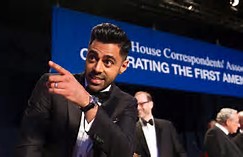
from abcnews.go.com
97. On April 29, 2017, Day 100 of his presidency, the White House Correspondents’ Dinner was held at the Washington Hilton. While Comedy Central’s Daily Show with Trevor Noah correspondent Hasan Minhaj was bringing the house down with his roast of the news media and the 45th president, Trump was at a rally in Harrisburg, Pennsylvania, paying tribute to his own administration with his “base” while the media and “Hollywood types”, as he put it, were “consoling themselves” over the November 8th election.
98. Trump’s crowd at the Harrisburg rally was predictable. Nearly all-White (though the “failing news media” made a point of prominently interviewing a solitary African-American Trump supporter who spoke glowingly of the administration’s first 100 days), regularly chanting “Lock her up” (yes, still) and “Build that wall.” Trump responded, “Don’t worry, we’re going to have the wall. Don’t even worry about it. ... Rest assured. Go home, go to sleep.” (http://www.msn.com/en-us/news/politics/trump-invigorates-enchants-crowd-
during-rally-in-harrisburg-pa/ar-BBAxuNY?li=BBnbcA1)
99. The president did not completely avoid the “failing news media”, however. Trump penned a commentary that was run in the Enemy of the People, specifically the Washington Post. We will share a few of his remarks here, but to read the commentary in full, go to the Washington Post’s page, https://www.washingtonpost.com/opinions/president-trump-in-my-first-100-days-
i-kept-my-promise-to-americans/2017/04 /29/ad1c9574-2cfd-11e7-a616-d7c8a68c1a66_story.html?utm_term=.e9327e270f2b: “Issue by issue, department by department, we are giving the people their country back. After decades of a shrinking middle class, open borders and the mass offshoring of American jobs and wealth, this government is working for the citizens of our country and no one else. … On energy … [w]e’ve canceled restrictions on the production of oil, natural gas and clean coal. … [O]n immigration and criminal enforcement … illegal border-crossings are down 73 percent. … Federal law enforcement has begun a crackdown on sanctuary cities that harbor criminal aliens … The Defense Department has begun to rebuild and restore our military readiness. … As we’ve made these changes — on the border, on our economy, on our security — confidence has soared. … Thousands of new jobs are being re-shored back to America … The White House is once again the People’s House. And I will do everything in my power to be the People’s President …” Of course, the Washington Post published other
commentaries on Trump’s first 100 days, some supportive (Hugh Hewitt and Marc A. Thiessen), others in rebuttal (Jonathan Alter).
100. A number of stories have been published warning of a rise in hate crimes as a result of the rise to power of Trump and his “America First” platform. Anti-Black, anti-Latino, anti-immigrant, anti-Muslim and even anti-Sikh harassment have been chronicled in cities such as Seattle, Washington (A Shooting in Seattle: Hate Crimes under Trump by Meredith McFadden, The Prindle Post, March 9, 2017, http://www.prindlepost.org/2017/03/shooting-seattle-hate-crimes-trump/); Bayonne, New Jersey (Taking Stock of Hate Under Trump, by Benjamin Wallace-Wells, March 14, 2017, The New Yorker, http://
www.newyorker.com/news/benjamin-wallace-wells/taking-stock-of-hate-under-trump); and Silver Spring, Maryland (Is America Racist? Under Donald Trump, Liberal Maryland Town Battles Hate Crimes, Prejudice Toward Immigrants, Blacks, by Tim Marcin, International Business Times, January 20, 2017, http://www.ibtimes.com/america-racist-under-donald-trump-liberal-
maryland-town-battles-hate-crimes-prejudice-2477740)
No doubt, by the time this piece is read, the Trump administration will have forged new frontiers (such as the dismantling of Let Girls Learn) in its rightward, downward spiral for the US and the world at large. Trump’s recent comment during the April 30 Face the Nation interview that the threat of war with North Korea and its potentially grievous casualties “trumps trade” may give some people hope that the long-expected “pivot” toward more presidential, more sensible behavior from him may be on the near horizon.
Well, one can dream.
